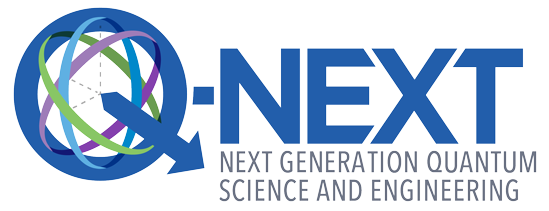In the News
-
The University of Chicago is working on an ‘unhackable’ internet
From WBEZ Chicago: University of Chicago scientists are developing a so-called quantum internet, a far more secure version of the web, that could make hacking impossible. Read More
-
Chicago scientists are testing an unhackable quantum internet in their basement closet
From The Washington Post: A 124-mile fiber-optic network runs from the University of Chicago on Chicago’s South Side to two federally funded labs in the western suburbs that are collaborating on the research — Argonne National Laboratory and Fermi National Accelerator Laboratory. The team behind the network is using photons to dispatch encryption keys through the network, to see how well they travel through fibers that pass under highways, bridges and toll booths. Read More
-
Pritzker Molecular Engineering professors David Awschalom and Liang Jiang awarded $1 million for development of South Korea-U.S. quantum center
From the University of Chicago: The National Research Foundation of South Korea has awarded two professors from the University of Chicago’s Pritzker School of Molecular Engineering $1 million to co-lead the creation of The Center for Quantum Error Correction, a South Korea-U.S. joint research center dedicated to quantum error correction. Q-NEXT Director David Awschalom and collaborator Liang Jiang will serve as co-principal investigators for the center. Read More
-
Quantum physics titans win Breakthrough Prize
From Scientific American: This year’s Breakthrough Prize in Fundamental Physics honors four pioneers who combined math, computer science and physics to do “foundational work in the field of quantum information.” The prize is shared between Charles Bennett of IBM, Gilles Brassard of the University of Montreal, David Deutsch of the University of Oxford and Peter Shor of the Massachusetts Institute of Technology. Read More
-
Prestigious New Horizons in Physics Prize awarded to UChicago Pritzker School of Molecular Engineering faculty Hannes Bernien
From the University of Chicago: Given to promising early-career researchers who have produced significant work, Q-NEXT collaborator Bernien and his colleagues are being recognized for developing optical tweezer arrays able to control individual atoms for use in quantum information science, metrology, and molecular physics. Read More
-
Scientists turn a nanowire with exotic currents into a probe for magnetism
From UIUC: A team of researchers led by Vidya Madhavan at the University of Illinois Urbana-Champaign added a twist to their scanning tunneling microscope by replacing the tip with a nanowire made from an exotic material. They use the nanowire to image magnetic features in an approach that has potential advantages compared to other methods. The team plans to modify the nanowire to see if it can reveal even more material features or, for example, detect particles called Majorana fermions, which have long been proposed as the basis for novel quantum computing devices. Read More
-
Building better quantum sensors
From the University of Chicago: Researchers at the University of Chicago led by Aashish Clark have developed a method to optimize a class of quantum sensors. The approach, published in PRX Quantum, takes advantage of the way defects in diamonds or semiconductors behave like qubits. Read More
-
Slimmed-down terminal transmits quantum keys from space
From Physics World: Q-NEXT member Paul Kwiat of the University of Illinois Urbana-Champaign comments on quantum key distribution in this piece on the successful transmission of quantum keys between a satellite and four ground stations by Hefei National Laboratory and the University of Science and Technology of China. Read More
-
Cross-institutional collaboration leads to new control over quantum dot qubits
From the Chicago Quantum Exchange: Researchers at the University of Wisconsin–Madison, HRL Laboratories, and University of New South Wales collaborate to better control silicon quantum dot qubits, allowing for higher-quality fabrication and use in wider applications. Read More
-
New doors opening: UChicago programs aim to help build the quantum workforce of the future
From the University of Chicago: Teaching quantum concepts early is key to sparking students' interest, but the newness of the field also means that quantum isn't currently part of most high school and undergraduate science curricula. Three outreach programs at the UChicago Pritzker School of Molecular Engineering, designed to expose a wide range of students to quantum, are changing the landscape. Read More
News and features
See all news and features-
Design rules and synthesis of quantum memory candidates
From the University of Illinois Urbana-Champaign: Researchers use density functional theory calculations to identify possible europium compounds to serve as a new quantum memory platform. They also synthesize one of the predicted compounds, a brand new, air-stable material that is a strong candidate for use… Read More
-
‘Ruler for light’ could enable detailed measurement in personal devices
Frequency combs have revolutionized precision measurement, but the bulky, power-hungry devices are limited to lab settings. A new efficient laser “microcomb” developed by Stanford researchers could bring that revolution to the handheld electronics realm. Read More
-
Resurrecting niobium for quantum science
For years, niobium was considered an underperformer when it came to superconducting qubits. Now scientists supported by Q-NEXT have found a way to engineer a high-performing niobium-based qubit and so take advantage of niobium’s superior qualities. Read More
-
Researchers from startups, government labs and academia develop new techniques for making qubits out of erbium
Argonne project addresses quantum technology challenges and highlight sthe versatility of a rare-earth metal used in lasers and to color glass. Read More
-
Meet Edward Schmitt, facilities engineer
Former Marine Corps electronics technician Edward Schmitt keeps the Argonne Quantum Foundry running while advocating for veterans. Read More
